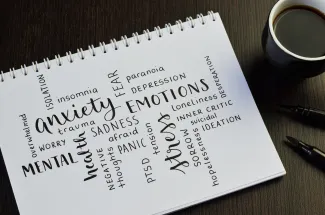
Medicaid cuts are likely to worsen mental health care in rural America
© zimmytws - iStock-2206705589
Across the nation, Medicaid is the single largest payer for mental health care, and in rural America, residents disproportionately rely on the public insurance program.
But Medicaid cuts in the massive tax and spending bill signed into law earlier this month will worsen mental health disparities in those communities, experts say, as patients lose coverage and rural health centers are unable to remain open amid a loss of funds.

“The context to begin with is, even with no Medicaid cuts, the access to mental health services in rural communities is spotty at best, just very spotty at best — and in many communities, there’s literally no care,” said Ron Manderscheid, former executive director of the National Association of County Behavioral Health and Developmental Disability Directors.
Cuts over the next 10 years could force low-income rural families to pay for mental health care out of pocket on top of driving farther for care, experts say. Many will simply forgo care for depression, bipolar disorder and other illnesses that need consistent treatment.
“Not only do you have very few services available, but you don’t have the resources to pay for the services,” Manderscheid said. “That makes the problem even worse.”
Rural communities are already at higher risk of suicide, with rates almost doubling over the past two decades. Already, rural communities are grappling with a shortage in mental health professionals, making them more vulnerable to losses compared with more urban areas, experts say.
Paul Mackie, assistant director of the Center for Rural Behavioral Health at Minnesota State University, Mankato, studies rural mental health workforce shortages.
“If it [coverage] goes away, what would then be the person’s next option if they already don’t have the resources?” said Mackie, who grew up on a rural Michigan dairy farm. “You can have a rural psychologist or a rural clinical social worker working under a shingle, literally alone.”

© JJ Gouin - iStock-1642293566
Small rural hospitals often provide critical behavioral health care access, he said. One analysis found the cuts next year would leave 380 rural hospitals at risk of shutting down.
States such as Mackie’s Minnesota, which expanded Medicaid eligibility under the 2010 Affordable Care Act, would suffer significant slashes in federal matches as a result of President Donald Trump’s signature legislation. The law, which includes tax cuts that disproportionately benefit the wealthy, cuts the federal government’s 90 percent matching ratefor enrollees covered under expansion to anywhere from 50 percent to 74 percent.
States will have to redetermine eligibility twice a year on millions enrolled under Medicaid expansion. Some Medicaid recipients also will have to prove work history. The new law creates work requirement exceptions for those with severe medical conditions — including mental disorders and substance use — but experts say proving those conditions may be convoluted. The exact qualifications and diagnoses for the exceptions haven’t been spelled out, according to a report by KFF, a health policy research organization.
Not only do you have very few services available, but you don't have the resources to pay for the services. That makes the problem even worse.
– Ron Manderscheid, former executive director of the National Association of County Behavioral Health and Developmental Disability Directors
“You can’t work when your mental illness is not treated,” said Dr. Heidi Alvey, an emergency and critical care medicine physician in Indiana. “It’s so counter to the reality of the situation.”
Alvey worked seven years at Baylor Scott & White Health’s hospital in Temple, Texas. As nearby rural critical access hospitals and other mental health centers shut down, the hospital became the only access point for people hours away, she said.
“People who just had absolutely no access to care were coming hours in to see us,” she said. Many had serious untreated mental health conditions, she said, and had to wait days or weeks in the emergency department until a care facility had an open bed.
She’s concerned that Medicaid cuts will only make those problems worse.

Jamie Freeny, director of the Center for School Behavioral Health at advocacy group Mental Health America of Greater Houston, worries for the rural families her center serves. The organization works with school districts across the state, including those in rural communities. Nearly 40 percent of the state’s more than 1,200 school districts are classified as rural.
She remembers one child whose family had to drive to another county for behavioral health. The family lost coverage during the Medicaid unwinding, as pandemic provisions for automatic re-reenrollment expired. The child stopped taking mental health medication and ended up dropping out of school.
“The child wasn’t getting the medicine that they needed, because their family couldn’t afford it,” Freeny said. “The catalyst for that was a lack of Medicaid. That’s just one family.
“Now, you’re multiplying that.”
Family medicine physician Dr. Ian Bennett sees Medicaid patients at the Vallejo Family Health Services Center of Solano County in California’s Bay Area. The community health clinic serves patients from across the area’s rural farm communities and combines primary care with mental health care services, Bennett said.
“When our patients lose Medicaid, which we expect that they will, then we’ll have to continue to take them, and that will be quite a strain on the finances of that system,” Bennett said. The center could even close, he said.
“The folks who are having the most difficulty managing their lives — and that’s made worse by having depression or substance use disorder — are going to be the folks most likely to drop off,” said Bennett, a University of Washington mental health services researcher. “The impacts down the road are clearly going to be much worse for society as we have less people able to function.”
The psychiatric care landscape across Michigan’s rural western lower peninsula is already scarce, said Joseph “Chip” Johnston. He’s the executive director of the Centra Wellness Network, a publicly funded community mental health care provider for Manistee and Benzie counties. The network serves Medicaid and uninsured patients from high-poverty communities.
“I used to have psychiatric units close by as an adjunct to my service,” he said. “And they’ve all closed. So, now the closest [psychiatric bed] for a child, for example, is at least two hours away.”
Those facilities are also expensive. A one-night stay in an inpatient psychiatric facility can be anywhere from $1,000 to $1,500 a night, he said.

















